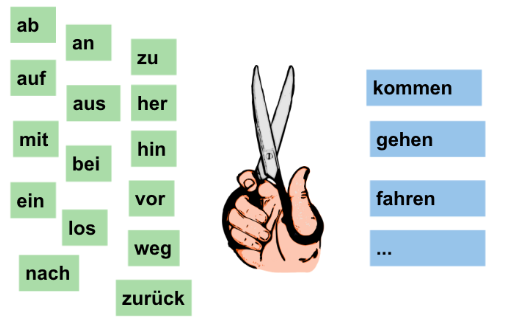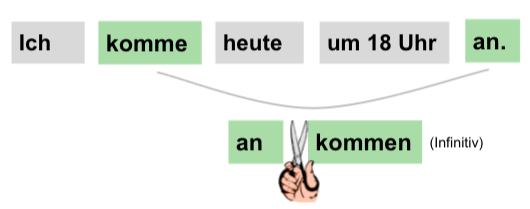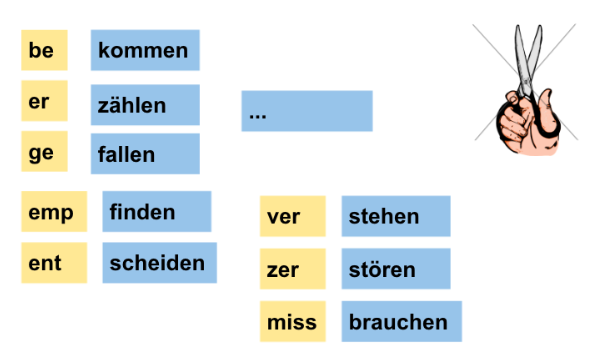What are separable and inseparable verbs?
In German, there are separable and inseparable verbs. Those are verbs that have a basic verb form added by a prefix that changes the meaning of the verb. You can combine these prefixes with many verbs.
Examples:
| separable | inseparable / not separable |
| ein + kaufen = einkaufen —> Ich kaufe ein auf + stehen = aufstehen —> Ich stehe auf aus + steigen = aussteigen —> Ich steige aus | ver + kaufen = verkaufen → Ich verkaufe be + stehen = bestehen → Ich bestehe miss + verstehen = missverstehen → Ich missverstehe |
Separable verbs (trennbare Verben) mean that they require separation after the prefix. In a sentence, this would be:
Ich kaufe im Supermarkt ein (I’m buying groceries at the supermarket), and NOT
*Ich einkaufe im Supermarkt.
On the other hand, inseparable verbs (untrennbare Verben) do not require separation after the prefix. We would say:
Ich verkaufe mein Auto (I sell my car), and NOT
*Ich kaufe mein Auto ver.
In both cases, the basic verb form has to be conjugated. Only the position of the prefix is different.
How to know if the verb is separable or not?
The prefix determines whether the verb has to be separated or not.
Separable verbs
The following prefixes you always have to separate from the verb:
ab-, an-, auf-, aus-, bei-, ein-, los-, mit-, nach-, her-, hin-, vor-, weg-, zu-, zurück-
Examples:
abfahren, ankommen, aufstehen, aussteigen, beilegen, einkaufen, losfahren, mitkommen, nachkommen, herkommen, hinkommen, vorkommen, weggehen, zumachen, zurückgehen

In present tense, you need to separate these verbs from their prefix and place them at the end of the sentence.
Example:

I’m arriving today at 6pm.
- Der Zug fährt morgen um 8 Uhr ab. (abfahren -> fährt…..ab)
The train leaves tomorrow at 8 am. - Ich komme am Sonntag um 18 Uhr an. (ankommen → komme ….ab)
I arrive on Sunday at 6 pm.
In past tense (Perfekt), you have to add “ge” between the prefix and the verb and you mustn’t separate them.
Example:
- Ich bin um 8 Uhr aufgestanden.
I woke up at 8 am. - Du bist gestern Abend am Bahnhof angekommen.
You arrived yesterday evening at the train station.
Inseparable verbs
The following prefixes always remain part of the verb, so you never separate them.
be-, emp-, ent-, er-, ge-, miss-, ver-, zer-
Examples:
bekommen, empfangen, entscheiden, erzählen, gefallen, missverstehen, verstehen, zerstören

In present tense, you would say:

I’m telling you a story.
- Ich bekomme ein Buch.
I’m getting a book. - Ich verstehe dich.
I understand you.
Past tense is never formed with “ge”. Instead, you use the prefix.
Example:
- Ich habe ein Buch bekommen.
I got a book. - Du hast mir eine Geschichte erzählt.
You told me a story.
Verbs that are separable or inseparable
There are some verbs whose prefix sometimes has to be separated, but sometimes not. That means the following prefixes:
durch-, hinter-, über-, um-, unter-
Some verbs with these prefixes always have to be separated
Example: umfallen – der Baum fällt um (the tree falls over)
Other verbs with these prefixes can never be separated
Example: umarmen – Ich umarme dich (I hug you)
Some verbs with these prefixes have two meanings and can either be separable or inseparable
Example:
umfahren – Er fährt das Schild um (he drives over the sign).
umfahren – Er umfährt das Schild (he drives around the sign).
Summary
- In German, there are separable and inseparable verbs
- it depends on the prefix whether it has to be separated or not
- In a sentence in the present tense, the verb has to be conjugated, the prefix has to be placed at the end of the sentence
- In a sentence in the past tense, you have to place a “ge” between the prefix and the verb (ich bin angekommen – I arrived), inseparable verbs do not get a “ge” but are formed by the prefix (ich habe bestanden – I passed)